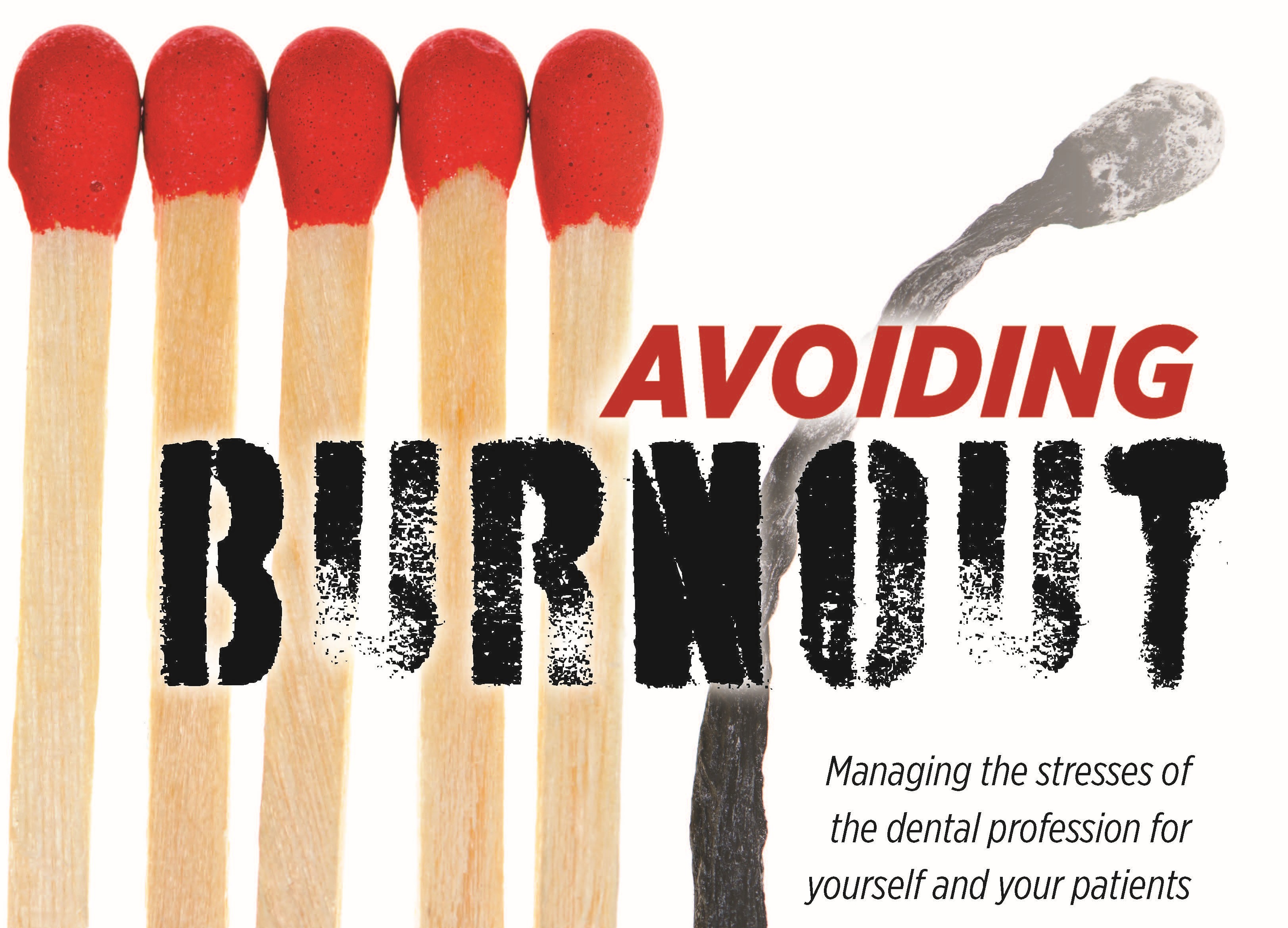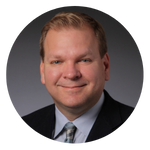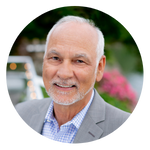Feb 21, 2024
News
Latest News from Benton-Franklin Counties Dental Society
Latest News from WSDA
Avoiding Burnout

Everyone feels stress from time to time. But is the problem more prevalent in dentistry than in other professional settings? What are some of the warning signs that normal, everyday stress is becoming something more serious, and posing the risk of personal or professional burnout? And what are the implications for dentists, office staff, and patients?
There’s no doubt the practice — and management — of dentistry can escalate stress and anxiety levels. Managing that pressure is important to the health and well-being of individual dentists, as well as the future of the profession.
In keeping with WSDA’s commitment to supporting its members’ health, WSDA News asked a small group of experts to offer their thoughts on these questions. Their answers below have been edited for length and clarity.
Our Roundtable Participants

Chris Bundy, MD, MPH, is executive medical director of the Washington Physicians Health Program, an independent nonprofit that provides resources for health care professionals experiencing physical or mental illness that could impact their ability to practice safely.

John Gibbons, DMD, is a retired pediatric dentist from Poulsbo. He is a former president of the Washington State Dental Association and currently serves as a member of the Associations Wellness Task Force.

Emily Hobart, DDS, is a dentist practicing in Anacortes. She is a member of the Washington State Dental Association Board of Directors and a member of the Association's Wellness Task Force.

Cameron L. Randall, PhD, is a clinical health psychologist and assistant professor of Oral Health Sciences at the University of Washington School of Dentistry, where he serves as Director of Institutional Culture and teaches behavioral science in the dental student and resident curricula.
What makes the potential of stress or burnout especially dangerous for dental professionals?
Dr. Chris Bundy, Washington Physicians Health Program: It’s a bidirectional issue. Burnout can increase the risk of problems in a practice, but those problems can also increase the risk of burnout. Stress and burnout can negatively affect quality of care and increase risk of malpractice. Dentists and all health care professionals are concerned about that.
Dr. John Gibbons, former WSDA President: The oral cavity is a difficult environment to work in and to maintain in ideal health. It takes a partnership between the doctor and the patient to have any chance to succeed. Failure in maintaining ideal oral health can be caused by either partner, but doctors who strive for perfection can find this a stressful profession.
Dr. Emily Hobart, WSDA Board Member: There is an element of danger for our patients. If you are not performing at 100% because you do not feel your best, you could be putting your patients at risk. Dentists perform highly technical microsurgery on human bodies. Messing that up isn’t an option. This makes burnout particularly dangerous for dentists.
Dr. Cameron Randall, University of Washington School of Dentistry: Stress and burnout for anyone may result in exhaustion, feelings of hopelessness, depression, anxiety, substance abuse, physical health problems, and — in thankfully rare but incredibly tragic cases — self-harm or suicide. But stress and burnout are especially dangerous for dental professionals because these phenomena are also associated with poor leadership and team discord, increased clinical errors, and unethical decision making. Further, stress and burnout are associated with premature departure from the profession, which contributes to workforce shortages and access to care problems for patients in our communities.
There are challenges (for example, dental benefit reimbursement rates and the dental workforce shortage) that are recognized for the stress they can inflict on a dentist. But is there anything unique about being a dentist that amplifies stress in the workplace?
Hobart: One of the things that strikes me about dentistry and other health care professions is how very expensive they are to get into, in terms of both money and time. You feel like you better be sure that this is what you want to do with the rest of your life, because you’re going to come out with crippling debt. It makes the stakes higher. I definitely felt that way my first year out of school when I worked in a less-than-desirable situation at a corporate practice. I came home every night questioning why I picked this career and woke up every morning thinking of ways to call in sick because I dreaded going to work. I felt hopelessly trapped. That’s why making sure dentists know that they are not alone and that there are resources for them is so essential. Even as we get more established in our careers, the fact that our job is highly technical, requires skill, is constantly changing and evolving can lead to burnout as well. Conversely, it is hard to devote yourself to continuing education when you feel like you’re at your wit’s end and your brain can’t brain today.
Randall: People in most every profession experience job-related stress. However, dental professionals may be at an increased risk of this stress and associated burnout for a number of reasons. For example, while rewarding (and even fun!), providing clinical care can be taxing physically, mentally, and emotionally. Dental professionals may experience things like moral distress and compassion fatigue. Navigating health care system issues related to insurance, record keeping, and compliance in an ever-changing landscape is also stressful. These unique challenges may amplify stress for dental professionals in a manner that is quite specific to the profession.
Gibbons: Most dentists go into the profession to help people, to make their lives better, to reduce suffering from pain. But the oral cavity is a very sensitive place to work in, and the potential for a patient having a bad experience is always on your mind. No dentist wants to hurt his patient (except for the dentist in “Little Shop of Horrors”). And dental education focuses almost completely on providing ideal treatment for patients; there’s almost no training on maintaining a successful business. With the high cost of dental education and the cost of doing business in today’s environment of high inflation, high interest rates, workforce shortages and stagnate reimbursement rates, it can be overwhelming, especially for the type of personality that’s attracted to dentistry.
Bundy: What amplifies stress in dentistry is the practice model in general. Dentists are more likely to be practicing independently than other health care professionals. They need to run a business in addition to practicing dentistry. There are financial pressures, HR pressures. Layering burnout onto that poses a risk to patients and a risk to everyone that counts on the practice.
What are some of the early warning signs that you might be feeling high levels of stress or facing potential burnout? How can you recognize when you are transitioning from the ordinary challenges of the workplace into an area where you are in danger of burnout?
Bundy: In health care, we’re kind of conditioned to compartmentalize pain. We work long hours and have to manage unpleasant experiences for our patients daily. Burnout is a chronic problem, not the result of one or two hard days. You can be tired without being burned out. But if you’ve gone for weeks or months where you’re not enjoying your work; you don’t have anything to give at home because you gave it all at the office; you’re asking yourself how you go this point and wonder whether this is the life you want to live — well, those are symptoms of potential burnout.
Gibbons: Change in sleep patterns — such as a lack of sleep or when it’s hard to get out of bed — can be indicators of extreme stress or depression. Also, changes in personal relationships or being distant or sharp with others can be signs. Feelings of isolation are another concern.
Hobart: Early warning signs to me would be a lack of joy in what you’re doing. When every little thing feels like a struggle and the feeling of being overwhelmed is all-consuming. The way I felt when I was in a horrible position — dreaming of calling in sick — that is a warning sign. Exhaustion, lack of interest in things that used to interest you, lack of zest for life — those are all warning signs.
Randall: Fleeting, acute stress is typically not a concern, but it is important to watch out for high levels of chronic stress, which can lead to burnout and other negative outcomes. Early warning signs may include new frequent headaches or muscle tension; ongoing fatigue or decreased energy; difficulty concentrating; changes in mood such as feeling irritable, anxious, or down; changes in sleep patterns; changes in appetite; increased substance use; and social withdrawal. Early warning signs of burnout may include new feelings of cynicism, helplessness, self-doubt or a loss of motivation or satisfaction at work. The new onset of a couple or more of these stress- and burnout-related symptoms is a good indication that a dental professional is transitioning from the effects of ordinary challenges to something more. Getting into the habit of routinely checking in with oneself for the sustained presence of two or three or more of these symptoms is a good way to recognize risk for chronic stress and burnout early enough to effectively intervene.
For the owner of a dental practice, should you try to insulate your employees from your personal stress levels? If so, what’s the best way to do that?
Bundy: This is the challenge for a dentist who has to lead a practice and maintain appropriate employer-employee boundaries. But if you’re stressed, your employees will know that. So, you have to be willing to be vulnerable — within appropriate boundaries. Most dental staffs really care deeply for the dentist. So you need to learn how to lean on them for appropriate kinds of help. It has to be OK to say, “I need some help attending to my well-being. How can we adjust practice to do that, and make things better for all of us?”
Gibbons: I think you should try your best to leave your stress at the door and keep it out of the office.
Hobart: Our staff members care deeply about us. We should not try to put on a brave face or not share with them when we are struggling. They want to help us and see us succeed. I would highly encourage dentists to talk to their staff members about their struggles with stress. They are probably having similar struggles and could at least commiserate, if not help lift you up in your time of need. Furthermore, hiding your struggles and feeling like you can’t show them or share them with others is what leads to the feeling of being alone and hopeless, which is dangerous feeling to have.
Is dealing with stress or burnout an inherently personal endeavor or should coworkers, family or friends be involved?
Hobart: While there is work that needs to be done personally for individuals to work on their stress – therapy, exercise, meditation, other wellness pursuits — it is also important to share your feelings with family and friends. You are not alone and should not struggle in silence. How can your family, friends and colleagues help you if they don’t even know about your struggles?
Bundy: One of the hardest things for dentists and all health care pros is learning to ask for help. We are trained to be the ones doing the helping. We’re often in control, running the show, not just in the office, but also at home and even in social situations. Setting aside that role can be hard. But we need to minimize the way that these problems can isolate us. Suffering in silence is not a place where we want anyone to be.
Gibbons: Life is complex and finding the right outlet for your personal stress is important. But isolation will only compound stress, so dealing with stress should not be completely an individual effort.
Randall: One of the biggest myths about stress and burnout is that it’s just a personal problem or completely caused by personal factors. In fact, stress and burnout have much less to do with the individual and much more to do with the environment in which that individual exists. The incorrect belief that stress and burnout is a personal problem can lead people to feel an inappropriate sense of failure or to feel isolated and alone, exacerbating the problem. Talking openly about stress and burnout with trusted colleagues, family, and friends can help dental professionals understand that their experience is not abnormal, and it can help them identify and utilize the support systems needed to reduce stress and burnout.
In your experience, are there things that concerned associates, family, or friends can do to make it easier for someone in danger of burnout to reach out for help?
Bundy: One approach is to engage the individual in identifying the perceived barriers to making a change. Maybe it’s their assumptions about productivity requirements. When you’re playing Whack-a-Mole, running from one fire to the next, it’s really easy to become inefficient and ineffective. Sometimes productivity consultants demand a dentist take more time away from the office, which is not only good for the dentist’s mental health, but they actually see productivity and profitability go up!
Hobart: Something that I feel helps me a lot is the open line of communication that I have with my staff members. We talk about anything and everything. I know that’s not for everyone, but it works for me. My staff is very loyal and trusting because they know I hold nothing back and am nothing but honest. That makes it much, much easier to talk about the hard things with them, because we are so close that we have already talked about the easy things. They know me well enough at this point to ask me if something’s off rather than ignore it. So, be present and available for your staff and they will do the same for you. That way when it’s time to reach out, there won’t be any hesitation.
Of the various support models (professional counseling, peer support, self-help materials, etc.), which do you believe are most effective?
Bundy: There’s really no firm evidence that supports one approach over another. But pound for pound, the best approaches always require connection with other humans. Anything that increases connections and reduces isolation is good. Self-help is an oxymoron. That’s where dental societies and associations and informal peer groups can come in; they can provide those connections. Paradoxically, when you are feeling overburdened and worry that you can’t take the time, that might be the most important time for you to get involved.
Hobart: When I was struggling with postpartum depression and anxiety, I came at it from all angles. I tried everything I could think of or that someone suggested. I tried medications, individual and group counseling, acupuncture, Rolfing, massage, yoga, reiki, TMS (transcranial magnetic stimulation), the list goes on. Some of them worked and some of them didn’t, but at the end of the day, the dark cloud lifted, and I eventually got back to feeling like my normal self. There are so many options to help someone that is struggling and there is no plan that works for everyone. It is okay to try something out and find that it’s not right for you. The important thing is to keep trying until you figure out what does work. Since the choices can be so overwhelming, however, I suggest that people seek the support of another person to help guide them through these choices and keep them from decision paralysis. A peer or counselor can help get you over the hump!
Gibbons: Everyone is different, and stress and burn out exist on a wide spectrum. So, all levels of support should be available, because what works in one situation might not be right in another.
Randall: The most effective interventions for stress and burnout typically depend on the chronicity and severity of the stress and burnout. Self-help materials can be useful for basic stress management and the prevention of burnout, with the most effective self-help materials being those rooted in evidence-based approaches from performance psychology or clinical psychology. Coaching can be useful for this, too. Peer support can be useful for dealing with higher levels of stress or ongoing, unresolved stress, as well as for dealing with early stages of burnout. Professional counseling is very effective for managing moderate to severe stress and more significant burnout. Importantly, the most effective approaches are those that someone is comfortable with, committed to, and finding benefit in fairly soon after starting.
What can be done to help prepare new dentists entering the profession to deal with the stress involved?
Randall: Because clinical errors, unethical decision making, and workforce issues are consequences of stress and burnout, I strongly believe that dental schools and residency programs have an ethical obligation to teach trainees how to manage stress and prevent burnout. Moreover, I believe they have an ethical obligation to structure their programs in ways that provide opportunities for trainees to practice good stress management strategies. Doing so prepares a capable and resilient workforce ready to meet the needs of patients and communities in an increasingly demanding and complex health care landscape.
Bundy: I think it needs to start before practice entry. There are good studies on the effectiveness of programs that have normalized counseling — instead of an opt-in option, make it standard with an opt-out option. Therapy shouldn’t be seen as a stigmatized intervention, but as an accepted part of maintaining your personal health. Therapy is like massage; you might need it to treat an injury, but more often you might benefit because it just feels good. It’s also important to remember that dentistry is a marathon, not a sprint. You need to pace yourself. It’s hard when you’re going into practice with lots of debts. You can impose a lot of pressure on yourself. But it’s a long road ahead. Look for mentorship; we can all benefit from a mentor that has been there. It’s a two-way health intervention — good for the mentor and mentee.
Hobart: I think talking about it more, especially in dental school, is essential. Learning more about the interpersonal aspects of dentistry, about working with others and not just the technical parts, would be extremely helpful too. Social media is a double-edged sword, because it does allow dentists a platform to voice their frustrations and get support from their peers, but it also sets people up to have unrealistic expectations of what their life and practice as a dentist should look like. Influencers only share the good stuff and their best face.
What does the research say about what works – and maybe what doesn’t – when it comes to reducing burnout?
Bundy: There’s been a search for the Holy Grail for a long time — the effort to identify the highest-ROI strategy for reducing burnout. We have to resist temptation to say that a certain thing is what will work for everyone. But one effective framework is self-determination theory. It’s ABC: A for autonomy, B for belonging, and C for competency. Competency is important to all dentists; staying up on developments in the field and so on. Autonomy might be more important to a dentist practicing as an employee. Belonging might be the priority for a practice owner. It’s valuable to understand where you are and respond accordingly.
Randall: Reminding oneself of the contributions of health care professionals, practicing gratitude, establishing boundaries between work and life, and seeking peer or professional support when needed are all helpful strategies for preventing burnout. At the organizational level, burnout can be prevented by systems changes that reduce the challenges and stressors experienced by health care professionals. Moreover, burnout can be prevented by maximizing autonomy and influence at work and by reinforcing their sense of professional purpose.
What role should WSDA and the ADA play in helping members through these struggles?
Bundy: Professional societies can help by curating excellent resources, so there’s a place where people in the profession can go to get high quality and highly relevant information. It’s important to make these resources visible, because the best information in the world won’t help if no one knows about it. And if a dentist needs to step away from their practice for a while, what systems can be put in place to care for patients and keep the lights on? Volunteering to help another is a wellness intervention for the volunteer, too.
Hobart: We need to provide quality resources and communicate the fact that they are available to our membership, so that everyone knows that these resources exist.
Randall: Local, state, and national dental professional organizations have an ethical obligation to support new dentists as they enter the profession. Providing individual-level resources such as stress management tools, peer support groups, and professional counseling services or recommendations is commendable. Senior dental professionals and peer groups can provide mentorship, coaching, and other support that helps colleagues deal with stress and burnout.
Gibbons: There is so much we can do for our members to help them be well. I believe we are on the right road in our commitment to helping each other wherever, and however, we can.
Organizations such as WSDA and the ADA can facilitate networking for mentor/coach matching and can establish peer groups that provide support to members. However, these organizations should also consider how they can shape the day-to-day lives of dental professionals through systemic and structural change. More than personal factors, environmental factors contribute to the experience of stress and burnout. Thus, it is critical for organized dentistry to advocate for policies and facilitate changes that make for a health care system that mitigates health care professional stress and burnout. Such efforts not only benefit new dentists entering the profession but all dental professionals.
This article originally appeared in Issue 2, 2025 of the WSDA News.

